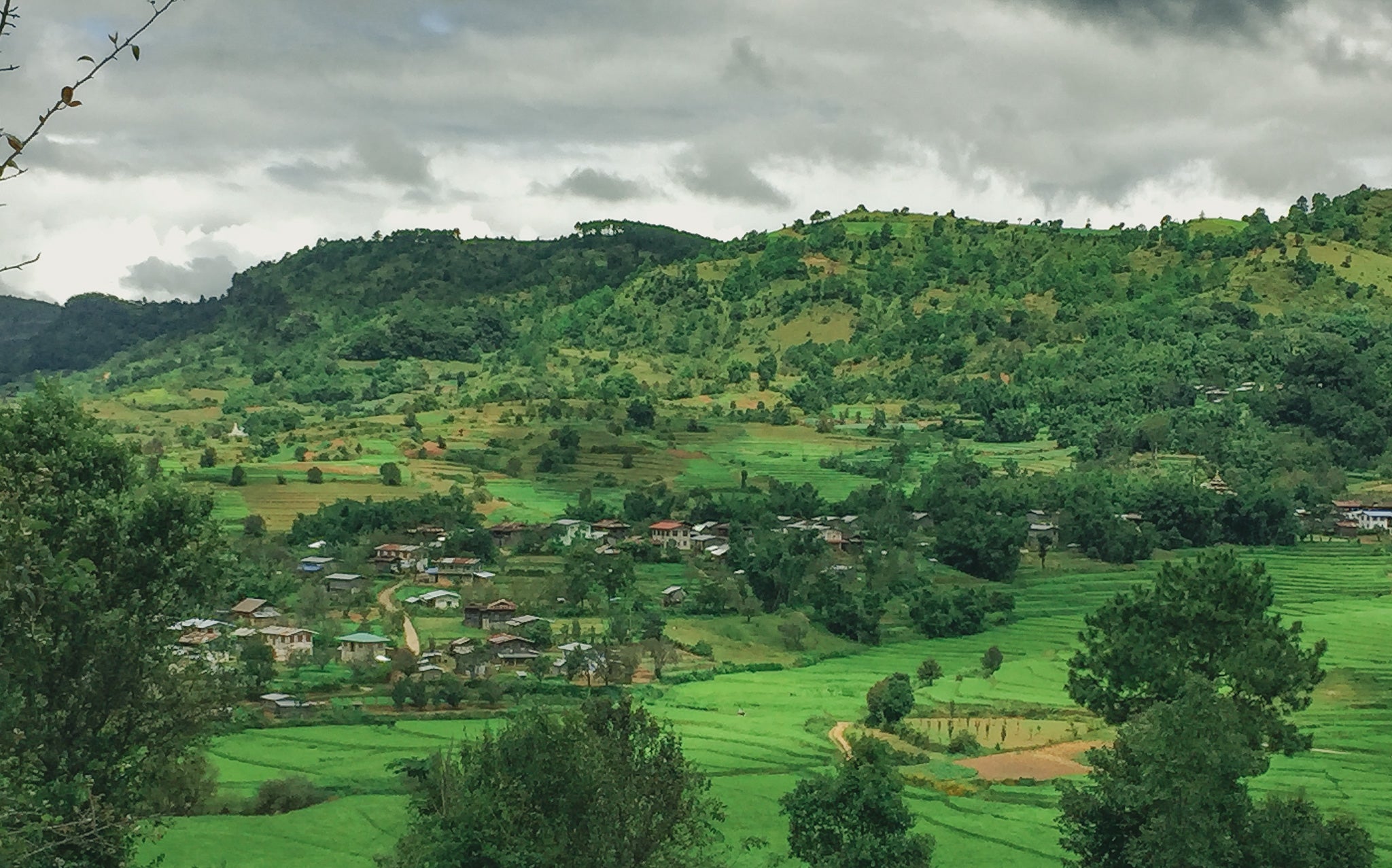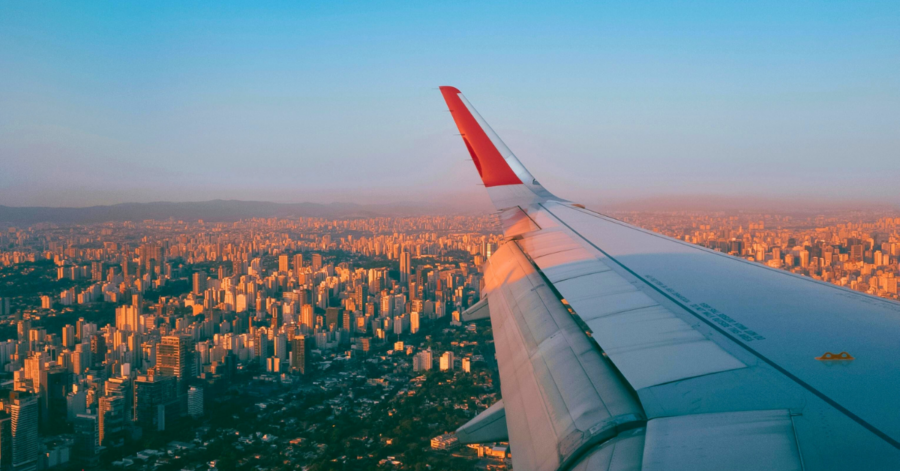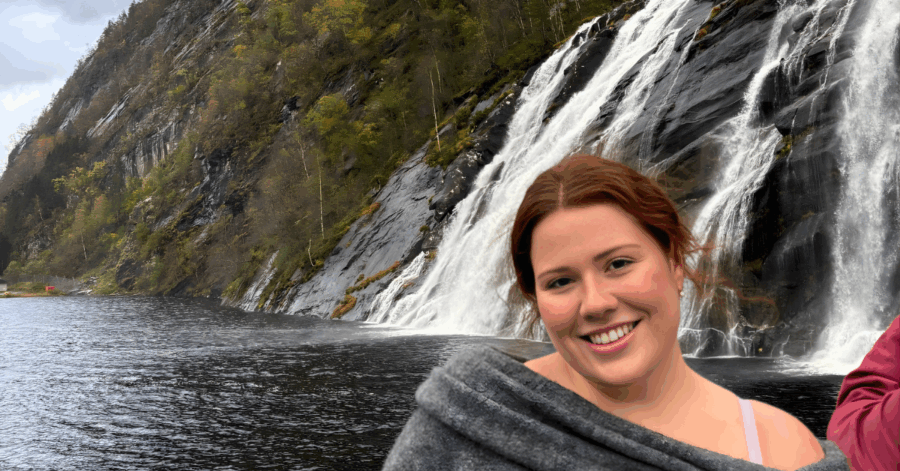This post was contributed by Parker Pflaum, coordinator for faculty-led programs, about his time in Myanmar as a program/trip leader who taught material for the student participants. This is the second post in a two-part series. Read Part I.
We are sitting on a slanted field on top of a hill overlooking Sin Leh. Some students are digging a hole to make a campfire. Other students are using my phone to read out the news to the rest of the group. A dark cloud over Sin Leh in the distance opens up and the daily rains begin. Drizzle hits us first, and then big, fat drops start to fall. We make a dash up the hill for the safety of the monastery.

We sit on the steps outside the monastery waiting out the rain. Some teenage boys continue to brave the rain for their love of playing chin lone, a game like volleyball but played with a small wicker ball with feet and head like soccer. The rain doesn’t seem like it’ll be stopping anytime soon. The abbot of the Buddhist monastery sees us sitting on his steps and welcomes us inside.
We take off our soaking shoes and rain jackets and trickle inside. We sit cross-legged in a circle on the floor in front of a statute of Siddhartha Gautama. Above the Buddha is a mural showing him giving his first teachings (called the first turning of the Wheel of Dharma) to his first five students—wandering holy men and ascetics that he had previously studied meditation with for six years—at Deer Park in Saranath, near Varanasi, in northern India.
While we chat, the abbot prepares tea and snacks for us. Thus begins another iteration of the endless cycle of giving and receiving snacks that marks life here. The abbot was offered these snacks that he in turn offers to us, and at the end of our visit we offer him yet more snacks that he will pass on to the next group of pilgrims. Thus, the culture encourages the habit of constantly giving and receiving and practicing gratitude and thanks.
As the intensity of the storm increases, and the pounding of the heavy rain on the tin roof seemingly nears a crescendo, the abbot gives us a blessing. In Danu dialect, which is similar to Burmese, he wishes that we fully realize impermanence, that all things change and come to an end, and that attachment is the source of our suffering. He wishes that we act with compassion and loving-kindness for all living things, practice kind thoughts, and live life correctly. And, finally, he wishes that we experience good things and meet with success and happiness in this iteration of the turning of the wheel of life.
Then he tells us the story of an old man from the village who recently had sickness in his abdomen. A group of six men carried him in a liter down the path to the nearest road, but the only local truck, which was built in China in the early 1980s, wouldn’t start. That man, who was unable to get to the clinic in Kalaw to get the treatment he needed, died while waiting for that truck to start.
When he heard of that incident, the abbot worked to gather enough donations to purchase a second-hand car to act as an ambulance for the local community. Eventually he scraped enough together to buy a cheap car, and for some time he managed emergency evacuations and took pregnant women to the hospital to give birth. But the car broke down, and he is once again trying to scrape together enough money to get it fixed up. In the meantime, there is the ever-present danger that a person will require emergency medical treatment and won’t be able to get to a clinic to receive it.
The monk has a big smile and chuckles as he serves us. Living in this place, it feels like we have all the time in the world. That life moves slowly, and there’s nothing stopping us from sitting in a monastery for three hours, chatting with a Buddhist monk, waiting out a slow moving thunderstorm, the last of the year’s vanishing monsoons.
——
The mud. It’s everywhere. The monsoons may have mostly departed, but it still rains once or twice a day. The rains have left behind a soggy landscape, seemingly more water than dry land. We regularly step in a sucking mixture of mud, clay, and water buffalo poop up to our calves or knees, which occasionally leaves us searching shoulder deep in the muck for a lost flip-flop.
We try hard to step cleverly to remain clean. The ground outside the front door of U Chit Phay’s house is a marsh, and a short trip to the outhouse is quite a splishy-splashy affair. To get clean, we take a bucket shower while wearing our longyis—which is the only way to shower in the village. It is an unusual experience, bathing publicly, even with a piece of cloth covering you. It’s not easy. At one point in the process, you need to hold up your longyi by biting it in your mouth to leave both hands free to clean below.
U Chit Phay doesn’t know anything about the U.S. electoral college system, nuclear weapons in North Korea, or the Magna Carta. He can’t work a laptop, nor has he ever traveled outside his extended community. Within his community, he is respected and knowledgeable; outside it, he would be largely helpless in the world that we call the “modern” or the “real” world.
I know about these things, these so-called “real world” things. U Chit Phay and I are on different life paths. But my hope is that these paths will lead us to a similar destination. A destination that is as simple as the words of advice that U Chit Phay gives to me: Do good things. Have kind thoughts. Live correctly.
While we fret about stepping in muck—being attached to being clean—U Chit Phay accepts that being dirty is impermanent. That only by getting dirty will you ever be able to get clean. And what’s the big deal anyway? Without effort, the mud will simply wash away in the rain or by wading through a stream along the way. Or if you must, go take a bucket shower in your longyi.
U Chit Phay finishes his prayers to the Buddha and puts away his prayer beads. He smiles at me. Then he stands up and shuffles over to sit beside me on the ground. He watches me use my computer for a while, then he shrugs his shoulders in confusion, with a silly smile on his face, confused at what I’m doing. Then he shuffles back to lay down at the base of the shrine to the Buddha to take a little snooze.
——
On our final night in Sin Leh, our students invited their host mothers over for a final ceremony at U Chit Phay’s house. The eight mothers sit in a line on either side of U Chit Phay at the base of the shrine, and the instructors and ten students sit cross-legged on the ground facing them. We offer them bowls of snacks and sundries, and we recite an ancient Buddhist Pali prayer asking for forgiveness for anything that we did or said or thought wrong that might have caused them suffering. Then we bend, bow and pray three times towards our gracious hosts and the Lord Buddha.
U Chit Phay then recites a blessing. Afterwards we bow three more times. A somewhat awkward silence deepens. What do we do now? Then a mother cracks a joke about the time a female student’s longyi slipped off while taking her first bucket shower. Another student’s mother asks her please not to leave, or at least to come visit again next year. She asks her student if she can visit her in America, but she worries whether there will be enough rice there to feed her.
There are smiles and laughter, farewells and admonitions to visit again exchanged between these two lines of people sitting on the ground cross-legged facing one another. U Chit Phay sits with them, all of them underneath the Lord Buddha. They are two lines of people who are following very different life paths. One line comes from money and privilege in America, full of possibility and choice, firmly planted in the so-called modern, real world. The other line is poorer and lives a simple life growing rice and other crops, living to the best of their ability in the Buddhist way. Two lines, two paths. But, we can hope, just one shared destination:
Do good things. Have kind thoughts. Live correctly.





